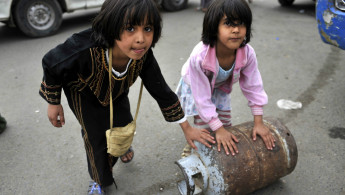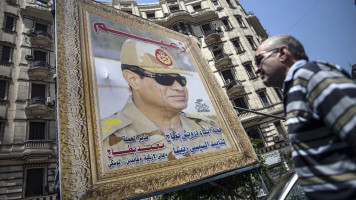When the gas runs out in Yemen
Yemeni cities have been suffering a severe shortage of cooking gas for several months.
Currently, cooking gas is being sold on the black market for significantly high prices. The price of a gas cylinder has reached 4,000 riyals, or about $20, where the official price does not usually exceed 1,200 riyals ($4.40).
In addition, some traders cheat their customers by manipulating the weight of the gas cylinders.
Recently, citizens have resorted to waiting in long queues in front of shops that sell cooking gas and autogas stations, which had led, in some cases, to clashes between citizens with the occasional use of knives.
RELATED: Houthi genmen overrun Yemen's national dialogue talks
Last March, Ali al-Khayat, a 20-year-old, died of severe injuries suffered in a fight in front of a gas station in the Ibb province in central Yemen.
The crisis has elevated the suffering of the Yemenis, especially those with low-income and who have gas-dependant professions, such as restaurant owners and taxi drivers.
The cooking gas crisis forced a number of small restaurants to close down and some families to completely rely on firewood for their needs, especially in villages and remote areas.
Amani Yahya, 33, told al-Araby al-Jadeed that she has to travel long distances to collect firewood from the mountains and valleys in order to cook with, noting that she had stopped using firewood only a short while back.
"The gas crisis is not new, but, this time, the prices shot up to crazy levels," Yahya said.
Restaurant owner Salah al-Qudsi was forced to close his shop in Hael Street in Sanaa for several days due to interruption in cooking gas supply and to occasionally buy his gas from the black market at high prices.
"When the gas supply completely shuts down, I would be forced to close my restaurant, but I would not hesitate to pay extra money to buy a gas cylinder found on the black market so not to lose my customers", he said.
| The gas crisis is not new, but, this time, the prices shot up to crazy levels. Amani Yahya |
In addition, some traders choose to buy and store full gas cylinders and close their gas retail shops, to later sell the gas on the black market, while others manipulate the weight of the cylinders.
In some cases, licensed gas store owners agree fraudulent deals with street vendors to sell manipulated gas cylinders.
Yemeni citizen Saleh al-Kamim refrained from buying gas from street sellers for fears of being cheated. "I currently buy gas from autogas filling stations, as their system relies on direct filling, which limits the possibilities for fraudulence," said Kamim.
Although the ministry of oil has repeatedly rejected the increase in the prices of gas cylinders, traders have been increasing gas retail prices for more than two months.
Yemeni citizens fear that the crisis had been fabricated by the authorities in preparation for the real crisis, a pattern used last year during the oil and diesel crisis that lasted several months and concluded with an official announcement of an increase in prices.
Haas, a gas station owner in Sanaa, told al-Araby: "Like many others, I heard of supervisory committees, but things seem to remain the same and people are forced to buy gas at high prices."
The ministry gave several reasons for the interruption of the gas supply, including a truck drivers' strike, a gas refinery unit malfunction in Aden, and roadblocks by militants in the gas-producing province of Marib.
However, governor Sultan al-Arada rejected these explanations and indicated that the flaw lay in the management and distribution of gas in the provinces, in addition to the extortion practised by agents in the provinces.
Mohammed Abdu al-Absi, an economist, said Yemen imports gas at global prices, but sells the gas at a very low price. He told al-Araby: "The cause of the current crisis is linked to funding as the government has no cash flow".
Absi also warns that the government's current economic policy will lead to a continued interruption in the gas supply and increase in prices, similar to the case of other forms of fuel.
This is an edited translation of the original Arabic.



